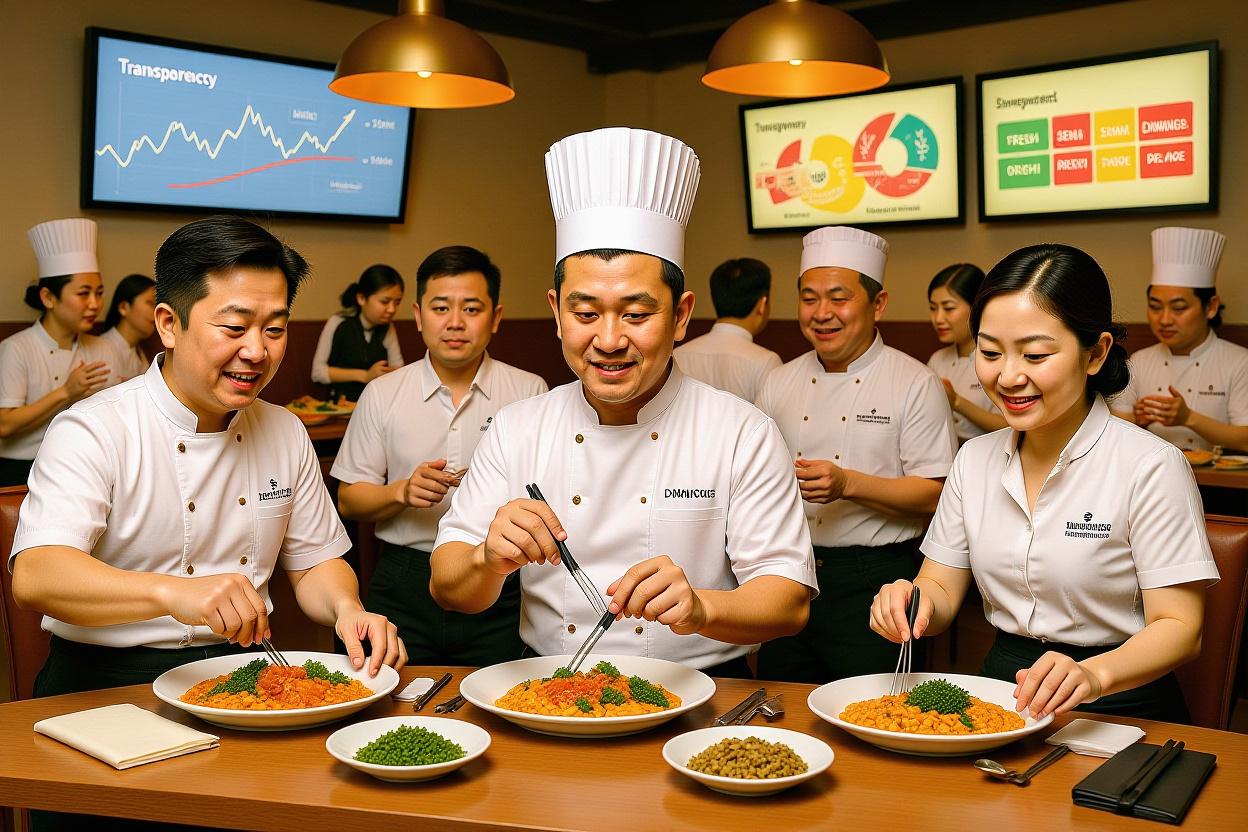Executive Summary
Key insights from China’s pre-made food industry shakeup:
– Major restaurant chains including Xibei and Haidilao face consumer backlash over pre-made food disclosure practices
– Industry-wide rebranding efforts signal deep-seated pre-made food shame among Chinese餐饮企业 (catering enterprises)
– Standardization and transparency emerge as critical solutions to bridge the trust gap between businesses and consumers
– Consumer education and regulatory frameworks needed to normalize pre-made food as modern culinary innovation
The Pre-Made Food Controversy Erupts
China’s restaurant industry faces an unprecedented credibility crisis as the pre-made food shame phenomenon sweeps through major culinary brands. The recent Xibei pre-made food controversy has triggered chain reactions across the sector, forcing餐饮企业 (catering enterprises) to reconsider their operational transparency and marketing claims. What began as isolated consumer complaints has evolved into an industry-wide reckoning about food authenticity and disclosure practices.
The situation reached critical mass when绿茶餐厅 (Green Tea Restaurant) quietly removed its “no pre-made dishes, freshly prepared” signage from outlets across Shenzhen. This symbolic retreat from previous marketing positions demonstrates how deeply the pre-made food shame has penetrated industry psychology. Rather than defending their practices, restaurants are retreating from previous claims, indicating widespread awareness that consumer expectations have fundamentally shifted.
Industry-Wide Rebranding Efforts
Beyond individual restaurants, entire industrial parks are distancing themselves from the pre-made food label. In Henan province, a major pre-made food production zone officially rebranded as “绿色食品创新示范产业园区” (Green Food Innovation Demonstration Industrial Park). This terminology shift reflects the depth of pre-made food shame permeating the industry, where even producers feel compelled to avoid the term despite working within this sector.
The linguistic dance around pre-made food terminology reveals an industry caught between operational realities and consumer perceptions. As one local official explained, enterprises aren’t producing预制菜 (pre-made food) but rather半成品菜 (semi-finished dishes) – a distinction without practical difference that underscores the emotional weight carried by the pre-made food label.
Understanding Pre-Made Food Shame
The phenomenon of pre-made food shame stems from multiple structural factors within China’s culinary landscape. At its core, this represents a collision between traditional dining expectations and modern food production realities. Chinese consumers historically value freshness and culinary craftsmanship, creating cognitive dissonance when confronted with industrialized food production methods.
This pre-made food shame isn’t merely about taste or quality concerns – it reflects deeper anxieties about food authenticity and transparency. When restaurants prominently advertise “freshly prepared” while relying on pre-made components, they create the conditions for consumer betrayal when the truth emerges. The emotional response exceeds practical concerns about food safety or quality, touching on fundamental questions of trust in food providers.
The Trust Deficit in Food Labeling
China’s pre-made food industry suffers from an acute standardization deficit. Without clear regulatory definitions for what constitutes pre-made food, restaurants operate in a gray area where marketing claims often diverge from kitchen realities. This ambiguity creates perfect conditions for pre-made food shame to flourish, as consumers lack objective standards to evaluate claims about food preparation methods.
The trust crisis extends beyond individual restaurants to encompass the entire food ecosystem. When consumers cannot distinguish between genuinely fresh preparations and pre-made items reheated in kitchens, they develop generalized skepticism about all restaurant claims. This environment of suspicion fuels pre-made food shame, making even legitimate uses of pre-made components feel somehow deceptive or inferior.
The Business Case for Pre-Made Food
Despite the current controversy, pre-made food represents an operational necessity for modern restaurant chains. The economics of scale, consistency, and efficiency drive the industry toward standardized preparation methods. For multi-location restaurants, pre-made components ensure identical dining experiences across different outlets while controlling costs and reducing kitchen complexity.
The operational benefits extend beyond mere cost reduction. Pre-made food enables restaurants to maintain consistent quality despite variations in kitchen staff skill levels. It reduces food waste through better inventory management and allows for more complex menu offerings that might be impractical with entirely from-scratch preparation. These business advantages explain why pre-made food shame conflicts with operational realities throughout the industry.
Economic Imperatives vs. Consumer Perception
The tension between economic necessities and consumer preferences creates the central paradox of pre-made food shame. Restaurants face competing pressures: investors demand scalability and efficiency while customers increasingly value authenticity and transparency. This conflict forces餐饮企业 (catering enterprises) into uncomfortable positions where they must balance operational requirements against marketing perceptions.
The financial implications of pre-made food shame are substantial. Companies that embrace transparency risk alienating customers who prefer the illusion of complete freshness. Those who conceal their use of pre-made components risk more severe backlash when discoveries occur. This dilemma explains why many restaurants have opted for vague terminology rather than clear disclosure, despite the long-term risks of this approach.
Transparency as the Antidote to Shame
The most promising solution to pre-made food shame lies in radical transparency. Forward-thinking restaurants are discovering that honesty about preparation methods can transform suspicion into competitive advantage. By openly disclosing their use of pre-made components while emphasizing quality controls and food safety standards, these establishments build trust through transparency rather than concealment.
老乡鸡 (Lao Xiang Ji) has pioneered this approach with their color-coded menu system identifying preparation methods. Green labels indicate restaurant-made items, yellow denotes semi-pre-made dishes, and red identifies reheated pre-made food. This system acknowledges the reality of modern restaurant operations while empowering consumers with information to make informed choices. Such transparency represents the most effective antidote to pre-made food shame.
Information Symmetry as Trust Builder
The fundamental driver of pre-made food shame is information asymmetry between restaurants and consumers. When restaurants control all information about food preparation while consumers must make decisions based on limited visible evidence, suspicion naturally flourishes. Breaking this pattern requires voluntarily reducing information advantages to build trust through disclosure.
Successful transparency initiatives demonstrate that consumers respond positively to honesty even when the revealed practices might initially seem less desirable. The act of disclosure itself builds credibility that can outweigh concerns about specific preparation methods. This psychological dynamic explains why restaurants embracing transparency often experience improved customer loyalty despite revealing practices that might theoretically trigger pre-made food shame.
Regulatory and Industry Solutions
Addressing pre-made food shame requires coordinated action across multiple stakeholders. Regulatory bodies must establish clear standards for terminology, preparation methods, and disclosure requirements. Without standardized definitions, restaurants cannot communicate consistently about their practices, and consumers cannot make informed comparisons between establishments.
Industry associations play a crucial role in normalizing pre-made food as a legitimate culinary approach. By developing best practices and educational materials, these organizations can help reshape consumer perceptions while providing restaurants with frameworks for ethical disclosure. The current pre-made food shame represents both a challenge and opportunity for industry leadership to demonstrate commitment to consumer interests.
Terminology Reformation Efforts
Professor Li Houqiang (李后强) from Sichuan Academy of Social Sciences has proposed renaming预制菜 (pre-made food) to预制食材 (pre-made ingredients). This terminology shift aims to reframe the conversation around component quality rather than finished product perception. Such linguistic adjustments could significantly reduce pre-made food shame by emphasizing the industrial nature of these products while distancing them from negative associations with inferior restaurant food.
The power of terminology in shaping perceptions shouldn’t be underestimated. As the Henan industrial park rebranding demonstrates, language choices directly influence how stakeholders perceive products and processes. A coordinated effort to develop more accurate, less emotionally charged terminology could substantially reduce pre-made food shame while allowing for more honest industry conversations.
The Path Forward for China’s Restaurant Industry
The resolution of pre-made food shame requires acknowledging that modern restaurant operations inevitably incorporate prepared components while maintaining commitment to quality and transparency. The romantic ideal of completely from-scratch preparation conflicts with the realities of scale, consistency, and affordability that consumers also demand. Embracing this duality represents the mature path forward for China’s餐饮企业 (catering enterprises).
Successful restaurants will increasingly differentiate through transparency practices rather than claims of absolute freshness. The trust built through honest communication about food preparation methods will become more valuable than any particular preparation approach. This evolution represents a healthy maturation of China’s dining culture, where informed choice replaces magical thinking about food origins.
Consumer Education and Acceptance
Ultimately, overcoming pre-made food shame requires consumer education about modern food production realities. Restaurants, regulators, and media must collaborate to create realistic expectations about how food reaches plates in contemporary dining settings. This educational effort should emphasize that preparation method doesn’t inherently determine quality, safety, or culinary value.
As consumers become more knowledgeable about food production systems, their acceptance of various preparation methods will naturally increase. The current pre-made food shame represents a transitional phase in this educational process, where discovery of reality conflicts with previously held assumptions. Through continued transparency and education, the industry can navigate toward a more informed and less judgmental relationship with pre-made food.
Embracing the Future of Food Service
The current crisis around pre-made food shame presents an opportunity for China’s restaurant industry to evolve toward greater transparency and consumer empowerment. Rather than fearing the revelation of operational practices, forward-thinking餐饮企业 (catering enterprises) are discovering that honesty builds stronger customer relationships than any marketing fiction about complete freshness.
The solution to pre-made food shame lies not in better concealment but in better communication. By embracing transparency, standardizing terminology, and educating consumers, the industry can transform suspicion into trust. This approach acknowledges the legitimate role of pre-made components in modern restaurants while respecting consumers’ right to make informed choices about their dining experiences.
Industry leaders should view current challenges as catalysts for positive change. The path forward requires courage to be transparent, commitment to quality regardless of preparation method, and compassion for consumer concerns. Through these approaches, China’s restaurant industry can overcome pre-made food shame and build a more sustainable, trustworthy dining ecosystem for the future.




